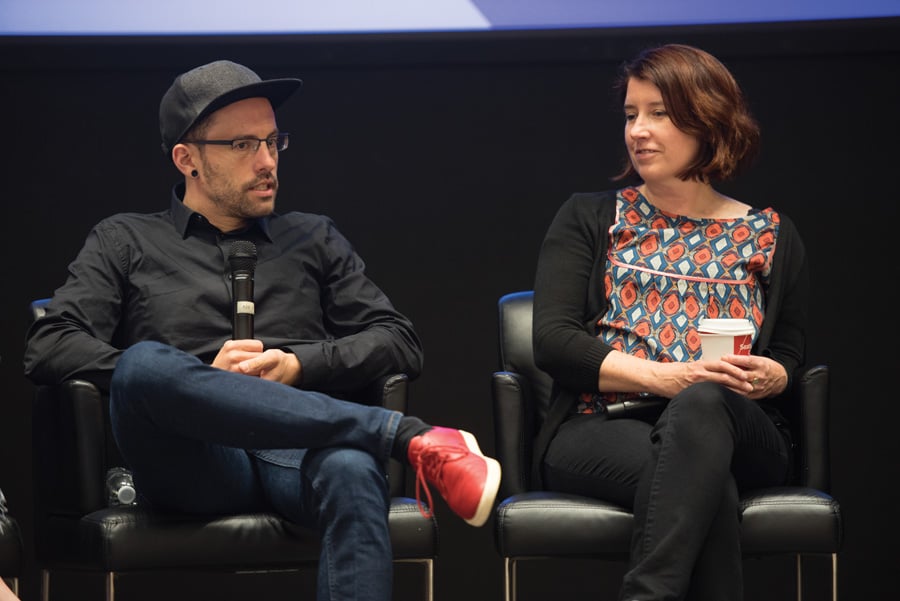Mother Jones senior reporter Shane Bauer talks undercover experience
Allie Goulding/The Daily Northwestern
Mother Jones senior reporter Shane Bauer and Mother Jones editor-in-chief Clara Jeffery speak at the McCormick Foundation Center Forum on Friday. Bauer shared his experience undercover as a private prison guard.
May 21, 2017
Mother Jones senior reporter Shane Bauer spent four months undercover as a private prison guard at the Winn Correctional Center in Winnfield, Louisiana to discover for himself the living and working conditions inside a private prison.
“It was a really chaotic place,” Bauer told The Daily before speaking at an event Friday. “People were constantly trying to psych you out — it was a really complex web of power. It was very tense.”
Bauer spoke to a group of about 70 students with Mother Jones editor in chief Clara Jeffery (Medill ’93) at the event, which was hosted by the Medill School of Journalism, Media, Integrated Marketing Communications in the McCormick Foundation Center Forum. Former Medill Prof. Louise Kiernan, Medill graduate student Kara Voght and Medill junior Julia Jacobs, former editor in chief of The Daily Northwestern, asked Bauer questions on stage.
Bauer is the 2017 recipient of the John Bartlow Martin Award for Public Interest Magazine Journalism for his article “My Four Months as a Private Prison Guard,” which was published in the July/August 2016 issue of Mother Jones. The Medill award highlights writers of prominent articles that “shed light on the causes, consequences and remedies of problems in American society,” according to the Medill website.
It took 18 months to create the article: four months of reporting and 14 months of writing, editing and fact-checking, Bauer said. He told The Daily that during his time undercover, he would identify and mentally “sketch out” possible scenes for his future article. Bauer said he was eager to write, but not to edit it or review the article with lawyers.
Jeffery said Bauer’s transparency was paramount during his time undercover. She said he used his real name and company of employment when applying for guard positions, and he tried to accurately depict daily life inside a private prison.
“There was a lot of debate and careful editing around what details we were going to disclose about guards and prisoners, because both frankly were people trapped inside the system,” Jeffery said. “That’s one of the most interesting things about Shane’s reporting.”
Jeffery added that the meaning of “journalism ethics” has changed over time. She said she has seen fewer investigative articles like Bauer’s due to an increasing amount of fear of legal action against news organizations.
Medill freshman Talley Morton said she attended the event because she enjoys Bauer’s writing. She said his work shows journalism is not something that can be taught in a classroom.
“He has a lot of experience to put behind what he does, which makes it hard for young journalists like this to learn, because it’s not like you learn the things that he has done in school,” Morton said.
Morton said she left the event recognizing the amount of support and teamwork it takes to contribute to an article like Bauer’s.
Medill Prof. Patti Wolter told The Daily that she organized Friday’s talk to introduce students to the reporting and publishing processes of important investigative pieces. She said the event shows how many people helped produce Bauer’s piece.
“Big stories like this don’t happen because of one person,” Wolter told The Daily. “It takes a team of people, and I wanted to have this conversation with students about the commitment that this investigation entailed.”
Email: elizabethbyrne2020@u.northwestern.edu
Twitter: @lizbyrne33



